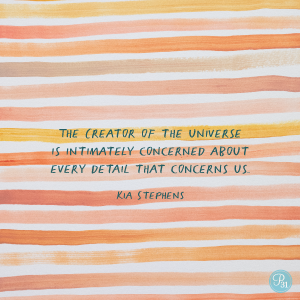
“See what great love the Father has lavished on us, that we should be called children of God! And that is what we are!” 1 John 3:1a (NIV)

“I don’t want you to die,” I mustered up the courage to say. My voice trembled as I held on to my last little bit of resolve to keep my emotions at bay. It didn’t work.
Hearing those words come out of my mouth ushered in a vulnerability I wasn’t prepared for. Death is difficult for me to talk about, especially when it’s in relation to someone I love. In this case, it was my uncle-cousin.
Biologically, he’s my second cousin, but he was raised as my mother’s brother. Throughout my life, he has modeled what it means to be a man, husband and father. From him, I learned masculinity could be tough and no-nonsense, while still embracing a tender heart.
It was this heart that embraced me in ways I didn’t know I needed.
For a little girl raised in a single-parent household, his presence was priceless. In many ways, our relationship became a semblance of the one I longed to have with my own father. This is why the thought of his death gripped me with fear.
Tears, like rivers, streamed down my face as we discussed his declining health. My stubborn will wanted to resist the possibility that his life was coming to an end.
Without him as a father figure, I would be left with an inconsistent and difficult relationship with my earthly dad. Although I love my father, our relationship has been characterized by a series of devastating disappointments. I know my experience is not unique.
Countless women have been wounded by their relationships with their biological fathers. Often these wounds linger, leaving women with a gnawing ache for the love and affirmation of their fathers. I know this ache well.
For many years, I fumbled around looking for hope on the pages of Scripture, believing God had something to say to women who, by no fault of their own, experienced father wounds. My quest led me to discover that God has woven intentional hope throughout the Bible for women just like me.
In 1 John 3:1a, John offers these comforting words: “See what great love the Father has lavished on us, that we should be called children of God! And that is what we are!” John expresses his amazement at the marvelous love of God. This incomprehensible love was demonstrated by sacrificing a sinless Christ for sinful humanity. Christ died a painful and agonizing death not just so our sins could be forgiven, but so we can have direct access to God as our heavenly Father.
There is no barrier between us and the unchanging Creator of the universe, who is intimately concerned about every detail that concerns us. Christ has escorted eternal hope and heavenly adoption into the life of every father-wounded woman who chooses to believe in Jesus as her Lord and Savior. John is letting us know that this extravagant and lavish love makes us children of God, daughters of the King.
I can remember hearing statements like, “God is a Father for the fatherless,” based on Psalm 68:5-6, and thinking to myself: How can this possibly be true? How can a heavenly Father be physically present like an earthly dad? My error was in attempting to understand 1 John 3:1 based on my own logical experiences. I know now that we understand this verse by faith.
Believers can confidently embrace God as their heavenly Father. Although a woman might experience heartache with her earthly dad, she can know eternal hope with her heavenly Father. I know this hope well.
As I reflect on this truth, my uncle-cousin is in hospice. His health has declined even more since the day we had that difficult conversation about death. Although I do not know what the final outcome will look like, I am choosing to trust in my heavenly Father who does.
Lord, thank You that You see me as Your child. And I thank You that I am a co-heir with Christ Jesus because I know You. Help me look to You to fulfill all my fatherly needs. In Jesus’ Name, Amen.
Romans 8:15, “The Spirit you received does not make you slaves, so that you live in fear again; rather, the Spirit you received brought about your adoption to sonship. And by him we cry, ‘Abba, Father.’” (NIV)
Psalm 68:5-6, “Father to the fatherless, defender of widows — this is God, whose dwelling is holy. God places the lonely in families; he sets the prisoners free and gives them joy. But he makes the rebellious live in a sun-scorched land.” (NLT)
It’s not too late to register for She Speaks Online: A Communicators Conference July 31-August 1! We believe God has given you a unique message only you can share with the world. She Speaks is here to equip and encourage you to bring that message to the masses in the most effective and powerful way possible. We've curated the ultimate online experience to make this the conference you’ve been waiting for! Register today!

Connect with Kia Stephens, who’s also one of our She Speaks presenters, for more insights from her post, “How Fathers Affect Our View of God.”
How have you experienced God as a heavenly Father? How does knowing God as your heavenly Father give you hope and peace?
If you’d like prayers for your relationship with your dad, join us in our comments section. And please, say a prayer for the person who left a comment before yours!
© 2020 by Kia Stephens. All rights reserved.
Join the Conversation